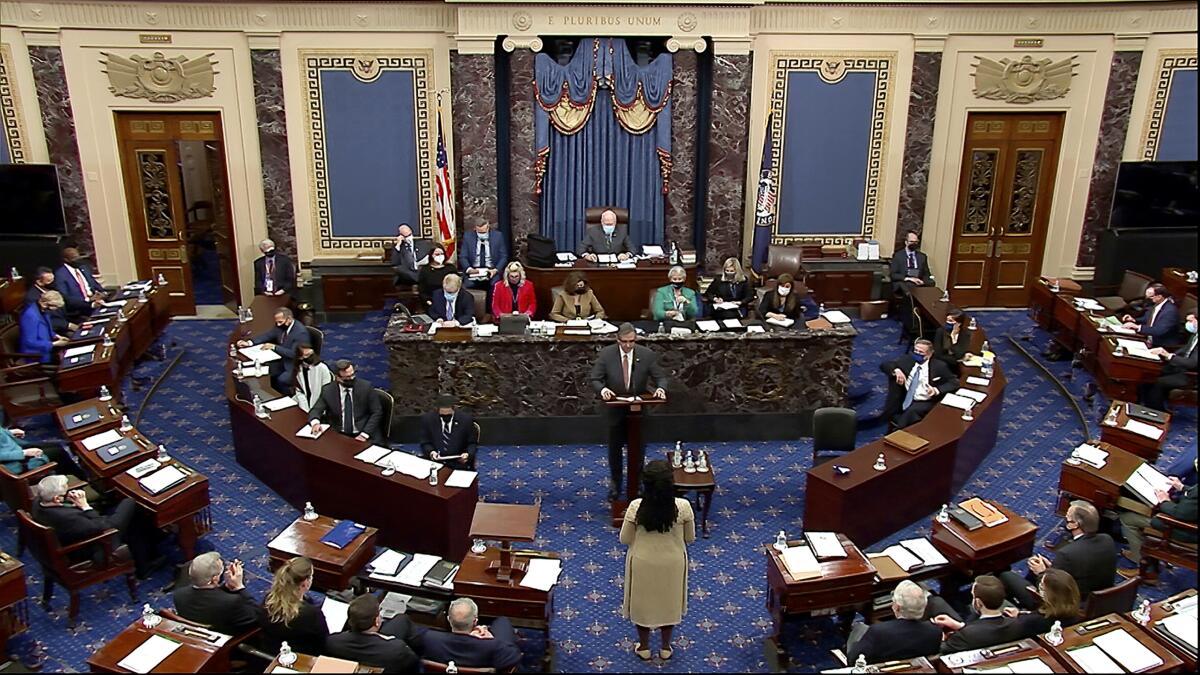Editorial: Trump’s acquittal is no vindication — and his enablers should be shamed and shunned

- Share via
The Senate’s failure to convict former President Trump for inciting a deadly insurrection is a miscarriage of justice. By any standard, managers from the House of Representatives established that Trump bears responsibility for the violent assault on the Capitol by crazed supporters eager to stop Congress from ratifying Joe Biden’s victory in a free and fair election.
The 43 Republican senators who voted to acquit Trump — some of them hiding behind specious constitutional objections and ignoring the precedents for convicting a former officeholder — have shamed themselves rather than offend Trump’s base. The Constitution rightly requires a supermajority for conviction in an impeachment trial; but the overwhelming case against Trump should have easily produced that margin.
Yet the trial was not in vain. Seven Republican senators did their duty and voted to convict, as did all 50 senators in the Democratic caucus, making it impossible for Trump and his apologists to claim that this impeachment was a purely partisan exercise. The trial’s greatest value, however, was in establishing for a national television audience just how great a threat Trump posed to American democracy — and might pose again.
Had the Senate convicted Trump, it could have proceeded to disqualify him, under the Constitution, from holding “any office of honor, trust or profit under the United States.” Ideally the powerful case mounted by the House will persuade voters and the Republican Party to bring about the same result.
The managers proved in devastating detail that Trump incited the Jan. 6 riot, not only in his inflammatory speech that day, but also in his long and duplicitous campaign to discredit the election and cling to power. They established that rioters thought they were acting at Trump’s direction. They showed that Trump behaved as recklessly after the assault on the Capitol as he did before his supporters followed his exhortation to “stop the steal.”
Finally, they made it clear that winking at and encouraging violence is a pattern for Trump, one that preceded his attempt to overturn the election results. As Rep. Jamie Raskin (D-Md.) said: “Jan. 6 was not some unexpected radical break from his normal law-abiding and peaceful disposition. This was his essential M.O. He knew that, egged on by his tweets, his lies and his promise of a ‘wild’ time in Washington to guarantee his grip on power, his most extreme followers would show up bright and early, ready to attack, ready to engage in violence, ready to ‘fight like hell’ for their hero.”
In their defense, Trump’s lawyers offered a grab bag of unconvincing arguments. They engaged in whataboutism (for example, by noting how Democrats have used the word “fight” when talking about their candidacies or their policies); made specious appeals to the 1st Amendment to excuse Trump’s fomenting; portrayed the impeachment as an attempt to disenfranchise Trump’s supporters; and suggested that in impeaching Trump the House was motivated by hatred for the former president rather than revulsion at the violence he incited and a determination to punish him for it.
Trump’s lawyers seized on a throwaway line in Trump’s speech about peaceful protest to transmute the incendiary demand to “stop the steal” at the Capitol into an appeal for ordinary political action. And they suggested, fallaciously, that the fact that some of the rioters may have planned violence before Trump’s speech — or showed up at the Capitol before the speech — meant that Trump couldn’t have incited others to storm the Capitol.
Fair-minded Americans — including many Trump voters — should come away from this revealing trial resolved never to allow Donald J. Trump to be treated as a legitimate participant in American political life, let alone be returned to the White House.
Sadly, given the polarization that Trump both promoted and profited from — and a stark divide in the media landscape — many of the former president’s most fervent followers will see his acquittal as vindication of a president who was subjected by the House to “constitutional cancel culture.”
Nor is it clear that the Republican Party is ready to relinquish its connection with Trump. Consider the way some state party organizations have reacted to members of Congress who voted their conscience in the impeachment process.
Rep. Liz Cheney (R-Wyo.), the third-most senior Republican in the House, was censured by the Wyoming Republican Party for voting to impeach Trump; the state party also called on her to resign. After Sen. Bill Cassidy (R-La.) voted that it was constitutional for the impeachment trial to proceed, the Republican Party of Louisiana issued a statement expressing profound disappointment and adding that “former President Trump is innocent of the politically motivated, bogus charges now pending against him in a kangaroo court presided over by an openly hostile political opponent.”
A president who has been twice impeached and who manipulated supporters into believing his election-fraud fantasy — ultimately delivering a harangue that sent some of them to invade the Capitol — should be shunned and shamed despite this acquittal. Republican senators who voted to acquit Trump because of a supposed constitutional objection should be in the forefront of the effort to ostracize him from their party.
As for the millions of voters who supported Trump, they need not renounce their past allegiance to him — or their agreement with his policy positions — to recognize that he betrayed them as well when he lied about a “rigged” election and incited the mob. He is not worthy of their loyalty.
More to Read
A cure for the common opinion
Get thought-provoking perspectives with our weekly newsletter.
You may occasionally receive promotional content from the Los Angeles Times.










